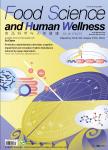Silkworm pupa peptide ameliorates dextrose sodium sulfate-induced colitis by enhancing gut barriers and modifying gut flora
出 版 物:《Food Science and Human Wellness》 (食品科学与人类健康(英文))
年 卷 期:2024年
核心收录:
学科分类:0832[工学-食品科学与工程(可授工学、农学学位)] 1002[医学-临床医学] 08[工学] 100201[医学-内科学(含:心血管病、血液病、呼吸系病、消化系病、内分泌与代谢病、肾病、风湿病、传染病)] 083201[工学-食品科学] 10[医学]
基 金:supported by the National Key Research and Development Program of China (2023YFF1103802)
摘 要:The anti-inflammatory properties of silkworm pupa peptide (SPP) have been recognized for their potential benefits in colitis treatment. However, the underlying mechanism of SPP in colitis animal models remains unclear. The objective of our work was to investigate the improving effect and the mechanism of action of SPP on a mouse model of dextrose sodium sulfate (DSS)-induced colitis. The findings suggested that SPP effectively eased ulcerative colitis (UC) symptoms in mice by decreasing disease activity index, ameliorating histopathological injury, and decreasing serum and colonic markers of inflammation. In addition, our research findings demonstrated that SPP restored intestinal barrier function by increasing the production of tight junction proteins such as zonula occludens-1 (ZO-1), claudin-1, claudin-3, occludin, and adherens junction protein E-cadherin1. Further, SPP supplementation enhanced the concentration of short-chain fatty acids and positively altered the makeup of the gut bacteria in the mice’s gut. These findings underscore SPP’s ability to slow the progression of colitis and point to its possible use as a functional component in dietary supplements for the prevention of early-stage colitis.



